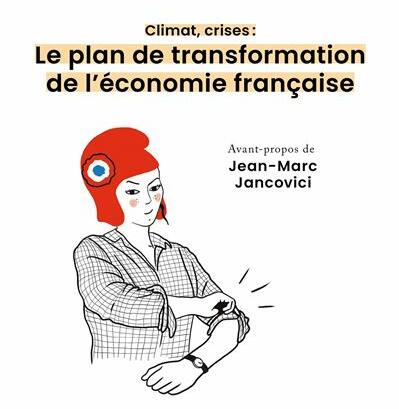Acknowledge the obstacles and suggest levers to change scopes of action
The Shift Project aims to develop a guide or a tool box to accompany action by relying on the experience of local stakeholders to successfully develop low-carbon mobility on a massive scale across territories.
Challenges and context
 The transportation sector is the largest source of greenhouse gas (GHG) emissions in France, accounting for nearly 30% of total emissions. Road transport generates 95% of the CO2 of transport-related emissions.
The transportation sector is the largest source of greenhouse gas (GHG) emissions in France, accounting for nearly 30% of total emissions. Road transport generates 95% of the CO2 of transport-related emissions.
The future Mobility Orientation Directive (Loi d’orientation des mobilités : LOM) provides a favorable context for a change of scope in the development of low-carbon mobility (see the dedicated press release). It designates local authorities as central players in the mobility transition. The Shift Project seeks to contribute to this perspective by developing a “Low-Carbon Mobility Guidebook”.
The Shift Project and Mobility
In its report “Decarbonize mobility, less carbon, more links” published in 2017, The Shift Project highlighted the potential of cycling, carpooling and express public transport to significantly reduce GHG emissions in peri-urban areas (up to 50% reduction, by combining these three areas of action in a consistent manner).
The investment effort needed remains moderate, and the French mobility budget, which has been extensively discussed today, has been slimmed down. The memos “Can we do better than the all-electric car in France” and “Car-sharing: yes, but only in complement to alternatives to the individual car” published as follow-ups to this report have also provided some guidance on the “best” and “worst” solutions.
The Shift Project took part in the “Assises de la mobilité”, in preparation for the LOM, and has submitted this report to a large number of territorial actors. Despite the fact that they are often in favor of the approach and sensitive to the report’s findings, numerous obstacles preventing them from implementing these mobility solutions have been cited.
Objectives and process
The Shift Project aims to develop an action support tool that will enable local and regional stakeholders to identify the obstacles to the implementation of low-carbon mobility solutions and to identify the conditions for their success. The objective is to provide a panorama to ensure that the appropriate resources are identified and deployed in an optimal and massive way.
It targets solutions with significant potential to reduce emissions. This study will be based on case studies from several jurisdictions/territories.
The secondary objective of this project is to promote an evolution of the territorial actors’ perspective on mobility, and to create a dynamic with these actors by leveraging the guide and the communication tools around it to encourage them to move forward with their actions.
This study is characterized by:
- A systemic approach to mobility, rather than a modal approach
- A territorialized approach (to bring out local considerations)
It focuses on:
- The mobility of people
- Daily transportation
Steering team
Laura FOGLIA – Project manager – +33 (0) 6 95 92 17 75 | laura.foglia@theshiftproject.org | laura.foglia@mobilites.net
Laura Foglia graduated in Economics at Bocconi University in Milan (Italy) and in Management at Ecole des Hautes Etudes Commerciales (HEC) in Paris. After a specialization in Transportation at the École Nationale des Ponts et Chaussées (ENPC), she has been working for 25 years in the field of Transportation and Mobility Planning at different territorial scales (regions, large metropolis, middle and small urban areas, periurban areas). Laura’s work focuses on the assessment and reorganization of transport systems, on urbanism-transportation interactions, on sustainable mobility, and on fare systems. Her professional experience includes Transportation Planning Consultancies (Systra, Artélia), Transport Authorities (Greater Paris Transport Authority), Research (Bocconi, ECIS, IFSTTAR) and Teaching in Higher Education (ENPC, EIVP, CNFPT…). Laura joined The Shift Project in 2018 to lead the project “Low-Carbon Mobility Guidebook”.
Alessia CLAUSSE – Mobility officer – +33 (0) 6 26 49 04 60 | alessia.clausse@theshiftproject.org
Alessia Clausse joined the Shift for an internship as Mobility Officer and to work alongside Laura Foglia on the project “Low-Carbon Mobility Guidebook”. She is graduating from a “Energy Policy and Sustainable Development” master’s degree at Sciences Po Grenoble. Before joining The Shift Project, Alessia Clausse was an intern at Eurelectric, the sector association representing the common interests of the electricity industry at pan-European level.
Clémence VORREUX – Coordinator – +33 (0) 7 71 80 46 25 | clemence.vorreux@theshiftproject.org
Clémence Vorreux joined The Shift Project to assist with Public Affairs & Mobility, focusing at first on peri-urban mobility. Starting 2018, she coordinates a project on Higher Education and Climate and, from mid-2018, one on developing a “guide” to low-carbon economy addressed to territorial players. She ensures the relationship with the association’s volunteers, The Shifters and participates in the communication and event organization. After graduating in European Policies and Public Affairs from Sciences Po Strasbourg, she first worked for the European Federation of Agencies and Regions for Energy and the Environment in Brussels.
Project Partners
The sponsors of this project are the Agence de l’environnement et de la maîtrise de l’Energie (ADEME), the Association des sociétés françaises d’autoroutes (ASFA), and Keolis. Other stakeholders are involved in this project as part of their expertise, such as the Group of Transport Authorities (GART), or the Union des Transports Publics (UTP).


